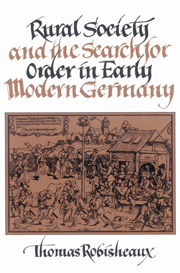Book contents
- Frontmatter
- Contents
- List of illustrations and tables
- Acknowledgments
- A note on usages
- Glossary
- List of abbreviations
- Introduction
- Part One Agrarian expansion, revolt, and the decay of community
- Part Two Search for order
- Part Three Crisis and recovery
- 8 Crisis
- 9 Agrarian order restored
- 10 Village society and the practice of state power
- Appendix A Distribution of wealth in Langenburg district, 1528–1581
- Appendix B Grain production and the peasant household
- Manuscript sources
- Bibliographical essay
- Index
9 - Agrarian order restored
Published online by Cambridge University Press: 05 May 2010
- Frontmatter
- Contents
- List of illustrations and tables
- Acknowledgments
- A note on usages
- Glossary
- List of abbreviations
- Introduction
- Part One Agrarian expansion, revolt, and the decay of community
- Part Two Search for order
- Part Three Crisis and recovery
- 8 Crisis
- 9 Agrarian order restored
- 10 Village society and the practice of state power
- Appendix A Distribution of wealth in Langenburg district, 1528–1581
- Appendix B Grain production and the peasant household
- Manuscript sources
- Bibliographical essay
- Index
Summary
The significance of the crisis of the seventeenth century for the whole of Central Europe is not easily summed up. In some rural areas the years between 1620 and 1660 marked a decisive turning point, a watershed, a final break with the past that confirmed radical changes in the agrarian order. East of the Elbe River a new agrarian order took hold. Powerful landed noble families consolidated their hold on lands laid waste in the war, confiscated freehold properties, built up large estates, or latifundia, and forced peasants into a humiliating form of servitude, often called the second serfdom. In other regions, in the German West particularly, the structures of order, authority, and social control, built up slowly in the sixteenth century, proved far more resilient than one might at first suppose. The demographic crisis may have ended the expansion of population, contributed to a reversal in agricultural prices and wages, and altered the commercial climate for agriculture. But old systems of heritable land tenure, the seigneurial rights of lords, and the village social structure changed little, if at all. In the reconstructed agrarian world of the German West the essential structures of property survived the crisis intact.
Scholars have often commented on the remarkable political and social stability that settled over Europe in the late seventeenth century.
- Type
- Chapter
- Information
- Rural Society and the Search for Order in Early Modern Germany , pp. 227 - 256Publisher: Cambridge University PressPrint publication year: 1989



